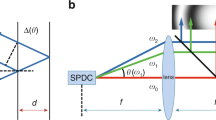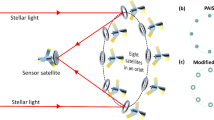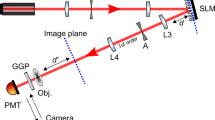Abstract
THE diffraction of light on a circular aperture in a thin opaque screen has been studied by G. B. Airy1, E. Lommel2 and many others after them. The experiment is of fundamental importance for the theory of the image formation in optical instruments. The formula given by Airy has been but little modified, and in its present form (Preston3) is: where X is the minimum separable distance between two neighbouring disks, representing points of the object, the wave-length of the light, F the focal length and d the diameter of the lens.
This is a preview of subscription content, access via your institution
Access options
Subscribe to this journal
Receive 51 print issues and online access
$199.00 per year
only $3.90 per issue
Buy this article
- Purchase on Springer Link
- Instant access to full article PDF
Prices may be subject to local taxes which are calculated during checkout
Similar content being viewed by others
References
Airy, G. B., Trans. Camb. Phil., 5, 238 (1834).
Lommnel, E., Beugungserscheinungen an einer Kalisronschen Öffnung, München, 1884.
Preston, T., ” The Theory of Light”, 327 (London, Macmillan & Co., Ltd., 5th Edition, 1928).
Author information
Authors and Affiliations
Rights and permissions
About this article
Cite this article
MERLING-EISENBERG, K. Diffraction Experiments on the Resolving Power of Telescopes and Microscopes. Nature 139, 416–417 (1937). https://doi.org/10.1038/139416a0
Issue Date:
DOI: https://doi.org/10.1038/139416a0
Comments
By submitting a comment you agree to abide by our Terms and Community Guidelines. If you find something abusive or that does not comply with our terms or guidelines please flag it as inappropriate.



